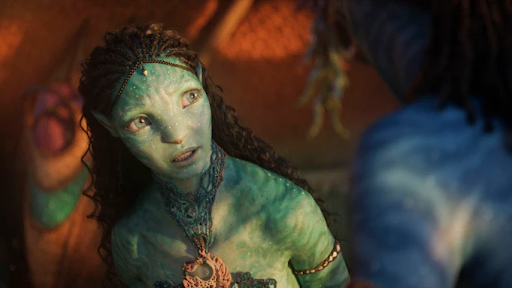Source: The Hollywood Reporter
In any other situation, an opening weekend gross of $134 million domestically and $441 million worldwide would be a sure sign of success, especially considering only a small handful of films this year have gotten anywhere near these totals. James Cameron’s “Avatar: The Way of Water”, the sequel to his insanely popular 2009 film “Avatar”, is no ordinary film however; said to have cost anywhere between $350 and $450 million (making it easily one of the most expensive film productions of all time), Cameron himself alleged that the film needed to become one of the highest grossing films of all time in order to at least break even. At least in terms of domestic grosses, “Avatar” has so far failed to live up to those expectations, falling short of the $150-$175 million it had been predicted to earn over its opening weekend. With all that said, nobody has yet to call the film an outright failure yet; the original “Avatar” opened to a (comparatively) meager $77 million back in December 2009 before legging out to a total of $760 domestically and becoming the highest-grossing film in the nation, and that’s on top of the several millions more made overseas that helped the film take the title of highest-grossing film worldwide. Many analysts are predicting a similar pattern to occur for “Avatar: The Way of Water”, which they believe will take advantage of the upcoming Christmas and New Year holidays, as well as the lack of any major competition until the release of “Ant-Man and the Wasp: Quantumania” in February, and develop strong legs throughout the coming weeks.
There’s also much attention being paid to the film’s performance outside North America, where it has so far made over twice as much as its domestic gross and will likely depend further on international sales in order to inch closer to a profit. Even that situation, however, has already shown to have some drawbacks, the most notable being the film’s performance so far in China, which has recently become one of the most lucrative film-going markets over the past few years. China was one nation where the original “Avatar” had generated a solid portion of its record-breaking grosses; in fact, a recent re-release in the nation allowed the film to reclaim its title as highest-grossing film worldwide from “Avengers: Endgame”, which managed to briefly outsell the film for a short time after its release in 2019. Given these events, as well as the fact that “Avatar: The Way of Water” has been one of the only Hollywood productions to secure a theatrical release in the country as of lately, one would think that the Middle Kingdom would be just as welcoming of its sequel; that doesn’t appear to be the case so far, but that might not entirely be the film’s fault.
Initial pre-sales and estimations originally anticipated that “Avatar: The Way of Water” would earn a weekend gross of well over $100 million in China, but by the end of the three-day period, the film had only earned roughly half of that predicted total, specifically around $57.1 million. Why such an underwhelming gross? Experts have cited a recent re-emergence of COVID-19 in Beijing and various other Chinese metropolitan markets. “China’s theatrical industry continues to labor under the impact of COVID, with significant impact to original estimates,” claims Rance Pow, whose company Artisan Gateway serves as a box office consultancy for the region. “This includes what may be a reluctance of people to return in force to public spaces, including cinemas — ironically, as COVID policies become more adaptable to local conditions.”
Another factor that may have hindered the box office performance of “Avatar”, and not just in China, is its long running time of well over three hours. Not only does this make it more difficult for theaters to offer as many different showtimes as possible, but for some film-goers, such an extensive length might be a bit too overwhelming. Granted, a run time of over three-hours is not an immediate deal breaker; both “The Lord of the Rings: Return of the King” and the aforementioned “Avengers: Endgame” both last for well over three hours, and both continue to rank high as some of the biggest cinematic money-makers of all time. Both those films, however, were immediate follow-ups that had come out just under a year after their respective predecessors. “Avatar: The Way of Water” arrived in theaters nearly thirteen years after the original “Avatar”, so for some, a three-hour running time to a sequel they saw over a decade ago (and might not even be that eager to see) might be more discouraging than encouraging. If China continues to take drastic measures in response to its latest COVID spike, then “Avatar 2‘s long runtime may work against it”, Pow claims.
Having said all that, there are some signs that “Avatar” could still pick up steam throughout China over the next few weeks. For one thing, social media scores on local sites like Maoyan and Douban indicate generally favorable reception from those who have managed to see the film. Also, $15.8 million of the weekend gross (about 27% of the overall total) was earned from the nation’s 735 IMAX screens, making the number the fourth highest-grossing opening for an IMAX release in China. “Avatar” was specifically designed for viewing in the largest theater format possible, so if it can continue to draw in audiences with its promise of the most thrilling viewing experience possible, the IMAX format could continue to serve as a major advantage.
Will the resurgence of COVID in China hinder the ability for “Avatar: The Way of Water” to make a respectable profit? Things aren’t looking great ideal at the moment, but as the original “Avatar” proved when it first came out, perhaps waiting things out will prove to be most advantageous in the long run.




